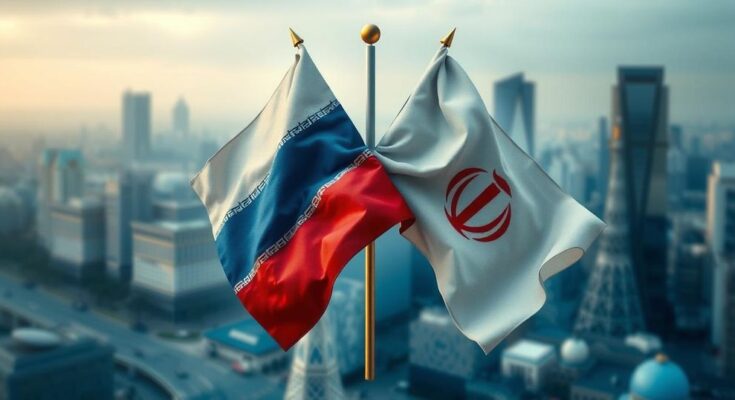Russia is set to sign a strategic partnership agreement with Iran, building on ties forged during its invasion of Ukraine. While the pact has been claimed to be non-aggressive by Russian officials, analysts warn it may facilitate military collaboration that could challenge Western stability. The partnership illustrates broader geopolitical shifts, as both nations aim to resist US-led sanctions and dominance.
Russia is poised to finalize a strategic partnership pact with Iran, reflecting deepening ties since the onset of its invasion of Ukraine. This agreement, akin to last year’s treaty with North Korea, highlights Moscow’s perception of a shifting global landscape unfavorable to the US-led order. Foreign Minister Sergei Lavrov asserts the pact is not aimed at third parties, asserting its peaceful intent, despite concerns in the West regarding potential military collaboration.
The partnership with Iran may evoke fears similar to those triggered by Russia’s previous agreement with North Korea, where a mutual defense clause raised alarms in Western capitals. Observations from experts indicate that Russia’s foreign policy is primarily motivated by its military objectives in Ukraine, making Tehran an appealing ally for logistical and military support amidst escalating economic pressures.
The US and UK have accused Iran of supplying ballistic missiles and drones to Russia for use in Ukraine, claims both nations deny. Alexander Gabuev from the Carnegie Russia Eurasia Center emphasizes the significance of this partnership, suggesting it predominantly serves Russia’s strategic interests in military advancements while providing Iran with vital technical assistance in armament production.
Russia’s Public Relations strategy appears to deflect any correlations between the treaty signing and US political events, as Kremlin spokesperson Dmitry Peskov dismissed conspiracies suggesting otherwise. Regardless, the partnership signals a deliberate challenge to Western dominance and reveals Moscow’s ambition to foster geopolitical multipolarity and cooperation against sanctions.
In summary, the impending agreement between Russia and Iran underscores the growing alliance between the two nations, which is strategically beneficial for both in the context of Western opposition. The pact serves as a stark reminder of the shifting dynamics in international relations and the potential rearming of adversaries against US influence.
This article discusses the impending strategic partnership pact between Russia and Iran, set to be signed amidst notable geopolitical tensions following Russia’s invasion of Ukraine. The relationship between these two nations has evolved as they seek to counter Western sanctions and build military capabilities. This accord parallels Russia’s previous agreement with North Korea, raising eyebrows within the United States and other allied nations while suggesting an emerging bloc of countries opposing Western interests.
In conclusion, the strategic partnership between Russia and Iran represents a significant development in global geopolitics, with potential ramifications for Western security interests. The agreement indicates both countries are attempting to solidify their positions in a rapidly changing world order by collaborating militarily and economically against perceived Western aggression.
Original Source: news.sky.com




